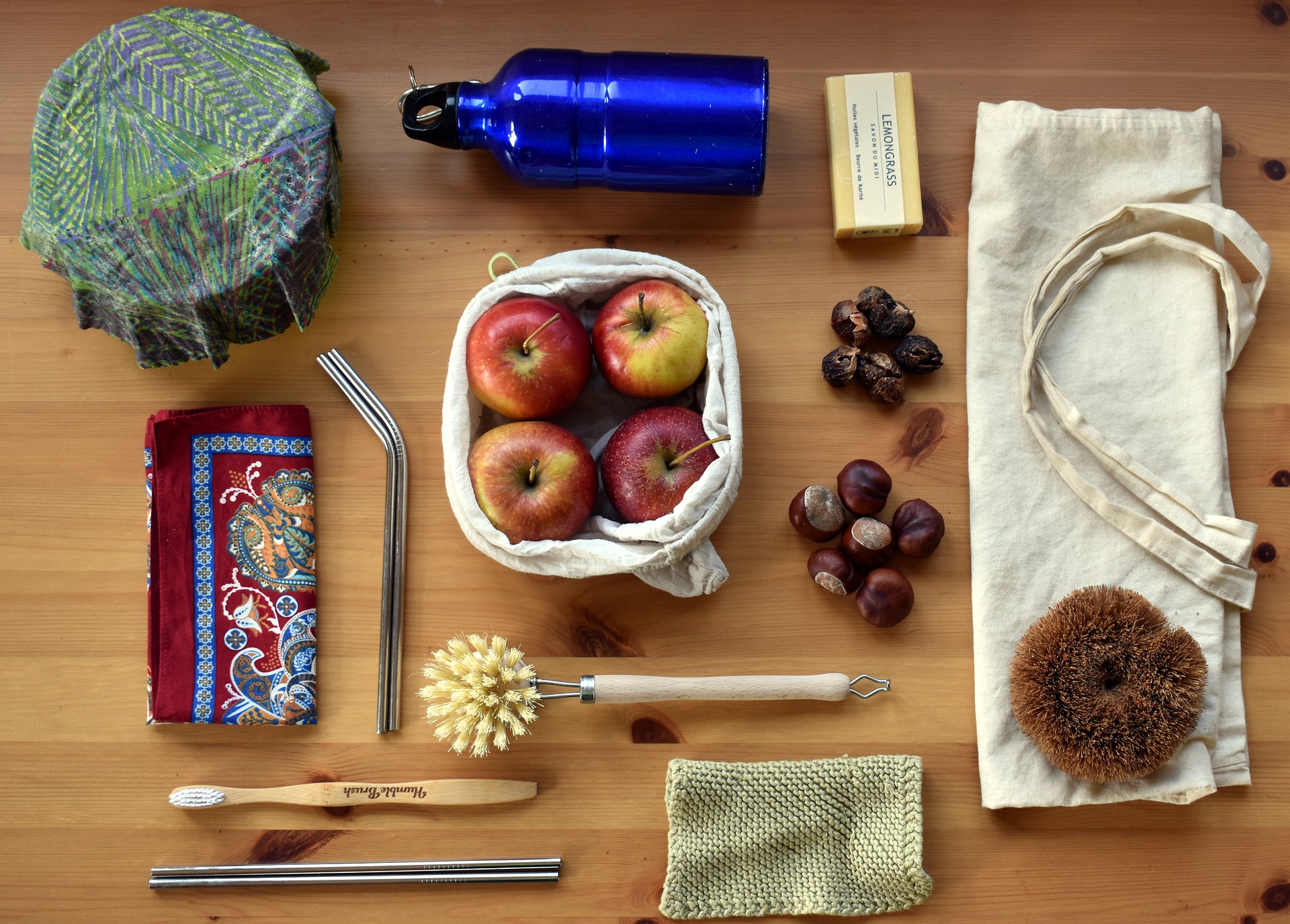What does waste reduction have to do with land conservation? Well, the items that you throw into the trash bin end up in landfills. Landfills consume natural habitats or the land that plants, animals and even people could live on. They also have the potential to pollute surrounding ground and water sources, and release pollutant gasses to the air. Therefore, reducing the amount of waste we create is an important way we can help protect local land.
Many of us know that we should try to reduce the amount of waste we produce, but how? This blog provides some tips to reduce the amount of waste you produce at home!
Reduce Single-Use Plastics
Disposable plastics, such as straws, grocery bags, and ziploc bags, take many years to breakdown, so our landfills fill up before the plastic has time to break down, meaning we have to create more landfills. Some types of plastic can also release toxic chemicals when they break down, that can seep into the ground and potentially the water supply.
Here are some ideas for ways to reduce single-use plastics:
Leave some cloth bags in your car so that you always have them on hand instead of using plastic bags at the grocery store. Or, if you’re prone to forgetting, you can invest in a fold up shopping bag keychain! Another good grocery store investment is to get reusable mesh produce bags, instead of putting your produce into plastic bags to take home.
Instead of using plastic straws for your drinks, invest in a metal straw! They are reusable, and often come with a small brush that makes it easy to clean so that you can use it over and over again. Another option is to use paper straws. These are inexpensive and disposable. They break down quickly and can be composted.
Use Tupperware containers, beeswax wrap, silicone zip bags and bowl covers instead of plastic Ziploc bags and cling wrap. These options are reusable and prevent you from having to throw out perfectly good plastic bags.
Bring your own water bottle! This reduces the amount of plastic bottles used, and you can customize a reusable bottle to match your personal sense of style.
You may think that paper coffee cups are okay to use since they biodegrade, but lots of coffee cups have a waxy film on the inside of the cup which makes it much harder to break down. Bring your own mug instead!
If you’re a tea drinker, consider buying loose tea instead of tea packaged in individual bags. Some teabags have a plastic-like finish that makes it hard for them to break down. Others are compostable, but may be wrapped in individual packaging, which creates unnecessary waste. This can all be avoided using loose tea!
Swap out your plastic razors for a metal safety razor - all you have to replace are the blades! We also recommend
DIY Cleaning Products
The convenience of being able to purchase cleaning supplies comes with a large cost to our environment, our health and our wallets. However, making your own eco-friendly cleaning products can be really easy as most cleaners are a combination of essential oils, baking soda, and vinegar. It takes less time and is significantly cheaper to DIY cleaning supplies than it is to go to the supermarket.
To make a natural all-purpose cleaner, mix ½ cup of vinegar and ¼ of baking soda into 2 litres of water. This can be used in the bathroom, the kitchen, on windows and more.
If you don’t feel like making your own, stores like Carbon Environmental Boutique and Earth’s General Store offer bulk cleaning and laundry products where you can bring in your own container for refills.
Have you heard of a shampoo bar? This nifty product is a great way to reduce the amount of plastic created from throwing out empty shampoo bottles. Shampoo bars are exactly what they sound like, shampoo for your hair, in the form of what looks like a bar of soap! No bottle needed. There’s nothing to throw away once you run out of the product. Jack 59 in Edmonton offers a number of great shampoo bars.
Using bars of soap rather than body wash is another way to reduce the amount of plastic you are throwing away. Just like the shampoo bars, using bars of soap means there isn’t a plastic bottle to throw away once you run out of the product. Using handcrafted soap is even better because you are supporting local business and you can be more sure of its ingredients!
Dentists tell us to replace our toothbrushes a few times per year. Think of how much waste is produced when we throw away our old toothbrush and replace it with a new one. One way we can be more eco-friendly when brushing our teeth is to use bamboo toothbrushes! Bamboo toothbrushes are biodegradable and reduce the amount of plastic wasted when we switch toothbrushes throughout the year. Toothpaste and mouthwash tablets are also an option for those that are really keen!
Instead of using sponges, try out a root whisk or bamboo brush.
Opt for cleaning products made out of renewable resources like wood or bamboo or recyclable ones like metal or glass.
Digitize Your Mail
Going digital is a good way to avoid unnecessary paper waste (and mental clutter) in your mailbox and your home. Your efforts to reduce paper use also saves a lot of trees! Here are some quick and easy tips and ideas to reduce the amount of paper waste produced at your home:
If your mailbox is filled with catalogues and junk mail, make sure you take the time to cancel subscriptions or request for things to be sent by email instead of regular mail.
Another way to avoid unwanted paper advertisements and flyers is to put a “No Junk Mail” sign on your mailbox.
To reduce your paper waste even more, take advantage of electronic statements from banks, automatic bill payments, and electronic airline tickets.
If you enjoy reading newspapers and magazines, consider switching to digital print so that you don’t waste paper trying to keep up with the times.
Other Tips
Compost your food. If you don’t have a suitable space to do this, consider vermicomposting indoors!
Get rid of your single-use cotton pads and use washable fabric pads - if you know how to sew, this is an easy DIY, but if not, these can be found at local markets or online. These are great for removing makeup and applying skincare products like toner.
Instead of buying expensive gift wrap every time you give a gift, use newspaper or fabric instead.
Taking steps to reduce the waste produced in your home not only helps the environment, but helps you to declutter your space. However, you should not stress about completely cutting waste out of your life either. As Zero Waste Chef Anne-Marie Bonneau says, “We don't need a handful of people doing zero waste perfectly. We need millions of people doing it imperfectly.”




